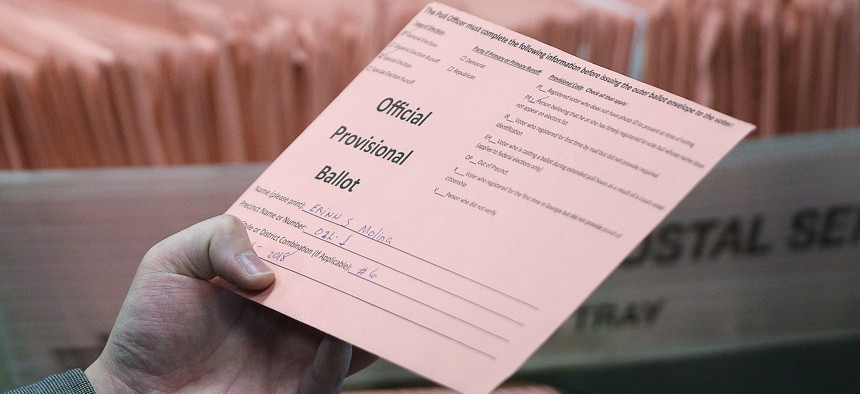Election Officials Spar Over Speed, Scope of Voter Registration Upgrades

In this Nov. 7, 2018 file photo, Fulton County election worker counts provisional ballots, in Atlanta. AP Photo/Mike Stewart
A long-planned overhaul of Iowa’s voter registration database will not be completed before the 2020 elections.
States are instituting a series of reforms and upgrades to secure voting systems ahead of the 2020 presidential election. But questions over how quickly reforms should be implemented have ignited tensions between one county auditor and the Iowa Secretary of State.
Iowa has long planned to replace its 14-year-old voter registration database, I-Voters, but the Secretary of State has said the system will remain in place through the 2020 elections. The state is on track to replace the outdated system and has made additional security upgrades since the 2016 presidential elections, said Kevin Hall, a spokesman for Secretary of State Paul Pate.
But Linn County Auditor Joel Miller has argued those upgrades aren’t enough. One of the state’s 99 auditors tasked with oversight of elections at the county level, Miller said the state is leaving in place outdated technology that could be exploited by hackers or foreign adversaries. To force the state to explain how it is allocating money to fix the voter database, he filed a complaint alleging the state has failed to comply with the Helping America Votes Act.
“Voter registration is our biggest vulnerability,” Miller said.
When an Iowa voter moves to a new precinct, it only takes the approval of an election official from the new precinct to switch the person’s registration, said Miller, highlighting one of his primary security concerns. That could be a vulnerability if hackers to infiltrate the I-Voters database and switch information for a large number of voters, he said.
“There are no checks and balances on the process,” Miller said. “We need to institute a two-man rule when voters are being moved. Someone else should be looking over someone’s shoulder to make sure that was an appropriate action to take.”
In Illinois, where Russian hackers infiltrated the state’s voter database in 2016, officials are spending millions upgrading election systems and helping local election officials pinpoint vulnerabilities.
In other states, recent upgrades have included transitioning to paper ballots or machines that leave a voter-verifiable paper trail or risk-based auditing of election results.
Election security experts have sought to highlight the degree to which voter databases are vulnerable to cyberattacks. Specifically, a report released last year by the National Academies of Sciences, Engineering, and Medicine recommended that election administrators “routinely assess the integrity of voter registration databases and put in place systems that detect efforts to probe, tamper with, or interfere with voter registration systems.”
The Iowa Secretary of State pushed back on the assertion the office has not done enough to secure voter registration databases to ward off the kind of intrusions attempted in 2016. Last year, the state began using a program called Vote Shield that “constantly” monitors changes in voter registration and would detect any anomalies or large-scale changes, Hall said.
“We receive weekly reports that we can analyze and also have a voting registration expert from the University of Iowa who analyzes the data,” Hall said.
Additionally, two-factor authentication is required for anyone to access the I-Voters system.
Miller’s concern over the ability to switch voters from one precinct to another without dual-approval is misplaced, Hall said, adding that without the capability election officials would not be able to complete same-day voter registrations.
As far as overhauling the I-Voters system is concerned, the office is still gathering information about possible replacements and plans to speak with election officials in other states about similar upgrades they’ve made to voter registration systems before committing to any particular system, Hall said.
“Replacing the system is a multiyear, multimillion-dollar project and remains on-schedule,” wrote Secretary Pate in a recent op-ed on the status of the state’s election system. “It is not something that can or should be rushed into blindly.”
Denise Fraise, the auditor of Lee County, Iowa and president of the Iowa State Association of County Auditors, said the upgrades made to the state’s voter registration system over the last few years have significantly improved security. Fraise said she endorses the Secretary of State’s approach.
“I think they are doing it the right way, taking their time and getting the right information,” Fraise said.
Rolling out a new system just before a major presidential election could create unnecessary headaches if the software didn’t work as planned, she said.
“We don’t like to bring out anything new ahead of a big election year,” she said. “If it doesn’t work, we are in a world of trouble.”
Andrea Noble is a staff correspondent for Route Fifty.
NEXT STORY: FirstNet releases roadmap for network enhancements





